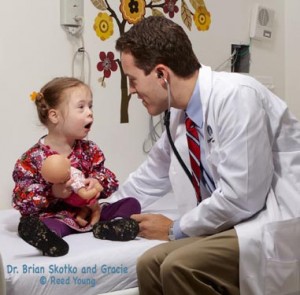TUESDAY TOPIC: A FEW WORDS ABOUT DOCTORS
First Word: Enter new doctor appointments with an information sheet.
Second Word: Don’t settle. Find the right doctor.
Third Word: Get an accurate diagnosis if a secondary diagnosis is suspected.
Information Sheet
It took me a few years to figure out this ingenious little medical helper, but by the time my son Jonathan (now 28, DS) had been through heart surgery, scarlet fever, and pneumonia, the light bulb went off. It was an invaluable time-saver and made doctor appointments extremely effective, so here it is:
Prepare a short but official-looking information sheet on your child, with these basic headings:
Name of Child
DOB
Today’s date
Diagnosis: (include all possible Diagnoses, e.g., “probable ASD, suspected CAS [Apraxia], etc.)
Current Issue: (this is the reason you’re sitting in the doctor’s examining room)
Past hospitalizations, surgeries, major illnesses, etc. (be brief):
Current Medications:
Allergies or Special Diets:
Tip: Be brief, succinct, pithy: no paragraphs. Just get to the point. You want the doctor to be able to read this quickly but thoroughly, as you sit there waiting for him to gather this crucial information.
Why do this?
1. You won’t believe how efficient this makes your visit, and how much it can improve the medical attention your child can get. And you won’t accidentally forget to mention something that would impact a doctor’s treatment decision. In the stress of the moment (with your child likely needing your attention), it’s too easy to forget to mention something important. With this info sheet, you’ve pulled together in one visual sweep everything important that’s scattered in your child’s medical files.
2. Doctors love it. Without exception, every doctor I did this for appreciated it. After all, it makes their job of caring for your child much easier, and they didn’t miss some important tidbit of information.
Find the Right Doctor
On that topic, here’s a passage from my book “Down Syndrome Parenting 101”:
“My work tutoring children with Down syndrome has brought me into close contact with many parents and their struggles or triumphs in finding a doctor who is a good fit for their child and themselves…
In some ways, medical times have changed since Jonathan was born in 1985, but today I still see parents making the mistake of “settling” for a doctor who reads from a very different book than they do. My message to you is: don’t settle. Don’t settle. Did I say that already?
There is a best doctor for every family, ‘A lid for every pot.’ You just have to find the right fit. Don’t give up until you do, because you’ll need to rely on this doctor’s help for years.
My own search took eight years. When I finally found the right doctor, my relief was palpable. I finally had a ‘team doctor,’ and I knew we would work together for Jonathan’s best care. I absolutely trusted him, and nodded to his knowledge and experience when we were of different minds.
This is what you’re going for: confidence in the doctor’s knowledge, experience, and intuition; and mutual trust and respect.
‘Sometimes I feel like I’m the doctor when I meet with my daughter’s pediatrician,’ one young mother told me. If you find yourself thinking, as she and other parents have, ‘Who’s the doctor here? Me?’ you might want to weigh the strengths and weaknesses of your choice and consider putting out a new search.”
HOW to find the right doctor?
If you’re lucky enough to have an online support group in your area, post the question: “I need a developmental pediatrician familiar with Down syndrome in or near My Town, etc.”
You can also consult www.yelp.com to check out doctors that friends might have suggested. Yelp has led me to the best doctors, dentists, chiropractors…you name it. Especially when you’re just starting out because your child is very young, or you’ve just had to relocate to another city, this can be a great resource. On Yelp, you’ll read what other patients have said about the doctor.
Get an Accurate Secondary Diagnosis
About secondary diagnoses…even now, in 2013, I am sometimes horrified at the stories I hear. Recently, a mother told me, “My child with Down syndrome is 6 and cannot speak even a single word, though she’s very bright. I asked my pediatrician about it, and he said, “Oh, that’s just because she has Down syndrome. Don’t worry about it.” Another mother of a 12-year-old with Down syndrome who is completely nonverbal was actually told by her pediatrician, “Oh, he’ll talk when he’s ready.”
Excuse me? What? How many kids with Down syndrome do these doctors know? Yes, speech delay and articulation difficulties are typical of the syndrome. But a bright six-year-old who can’t speak a word no matter how hard she tries? A completely nonverbal 12-year-old who can’t attend to anything in the classroom? You’re looking at a secondary diagnosis. This is not something to sweep under the rug.
Getting a correct and early diagnosis, no matter what the secondary diagnosis might be, is critical; if it’s Childhood Apraxia of Speech (CAS), for example, or if the child is on the Autism spectrum (ASD), specialized therapy is going to be needed, and the sooner, the better. If the problem is swept under the rug by a careless (or poorly qualified) assessment team, and given the description, “developmental speech delay,” for example, that’s not going to get your child the help he needs. You need a medical diagnosis, which CAS or ASD are. A medical diagnosis will get you needed therapy; the diagnosis of “developmental delay” is not a medical diagnosis and will not get you that help. So be sure there isn’t a secondary diagnosis impacting your child’s life.
A Recap:
1. Enter new doctor appointments with an information sheet.
2. Don’t settle. Find the right doctor.
3. Get an accurate diagnosis if a secondary diagnosis is suspected.
Eh…What’s up, Doc?
I’ll tell you what’s up: a fantastic, caring, knowledgeable (or at least receptive to learning about DS), “best fit for you” doctor. Look until you find him/her, and don’t settle!
Searchlights Beaming,


I live in the UK and have a D S Grandson who is now 5. He has been having speech therapy since he was about 2 and that is purely on th Diagnosis of Down’s Syndrome. They start therapies long before they are old enough to go to pre-school and they are taught Makaton (This needs the parent’s to co-operate and learn it as well, preferably the whole extended family). My Grand son does say some words clearly and quite a lot that we understand but strangers would not but he also does the signs as he says them. He has a 2 year old brother who has picked up the Makaton signing and signs when he speaks so it has to be a family thing not just relying on a therapist.
In the UK if a child is diagnosed with having Down’s Syndrome then they get the therapies they need at the age that they need them. They are assessed every 6 months for the Down’s Syndrome and as often as is necessary for the medical problems that can go with it. By age 3 my grandson had had his tonsils and adenoids removed as they were causing him problems and pushing his tongue forward, he gets many chest infections and sees a Specialist regularly. They have been told if they are not happy with any treatment when he is in the local hospital for his chest they only have to tell the Doctor there that they want him transferred to the hospital where the Specialist he sees is based and he will get transferred. He gets pneumonia so often that I think this is why they have said that.
All the various professionals he sees and they are not just a few, send all their results to The Community Down’s Syndrome Consultant who is also a Paediatrician at a hospital nearby. Having all the results means that he can make a better assessment of what therapies are needed and how much he needs. This saves the parents having to do all the work that it says in this article.
I cannot see how Down’s Syndrome itself is not a diagnosis for Doctors to look for all the many conditions that children with this diagnosis get. It sound more like there is something wrong with the Health System where you are.
Hi, Grace. Your last line made me laugh. Touché! Yes, we struggle here. I have seen so many children with DS be denied an accurate secondary diagnosis (.e.g, autism) and therefore denied highly specialized service.
Thank you for your post! It helps to be prepared!